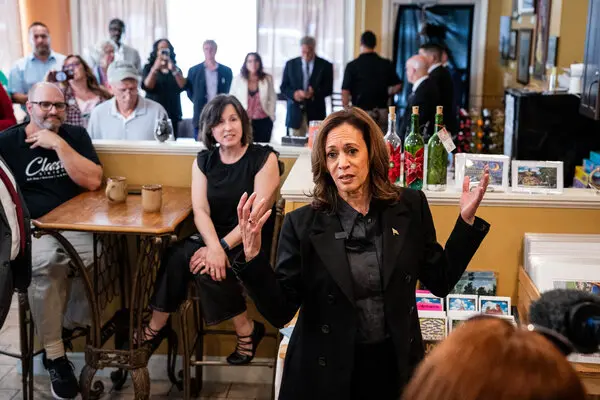
If elected president, Kamala Harris pledges to eliminate the College Degree Requirements for federal jobs
US Vice President Harris has committed to abolishing the university degree prerequisites for some federal positions, with the goal of expanding prospects for individuals without a degree.
On Friday, U.S. Vice President Kamala Harris, the Democratic nominee for president, declared her intention to abolish the need of a college degree for some federal positions in the event of her election.
The decision, intended to expand opportunities for government employment, is made as Harris and her Republican rival, former President Donald Trump, engage in a fiercely disputed fight leading up to the November 5 general elections.
“As president, I will eliminate the superfluous educational prerequisites for federal positions in order to expand employment opportunities for individuals without a four-year degree,” Harris announced during a campaign rally in Wilkes-Barre, Pennsylvania.
The statement made by Harris highlights a crucial aspect of her campaign aimed at appealing to individuals who may perceive themselves as marginalized by the existing economic structure. Statistics from the U.S. Census Bureau, published earlier this year, indicated that more than 62% of individuals aged 25 or above in the United States do not possess a graduation degree. These folks constituted 72.5% of the voters in the 2020 election, a group that both Harris and Trump are diligently attempting to influence.
According to Harris, it is imperative for the United States to acknowledge different avenues to achieve success, such as apprenticeships and technical training programs.
“A degree does not necessarily indicate a person’s skills,” Harris argued, questioning the conventional belief that education is the main pathway to social advancement. Furthermore, she urged the business sector to reassess its recruitment procedures and eliminate superfluous degree prerequisites.
The decision coincides with a period of notable change in popular perception about the worth of a higher education. A poll conducted by Gallup and the Lumina Foundation revealed that a significant number of Americans harbor doubts regarding the financial implications and benefits of obtaining a college degree. A majority of U.S. people who either did not enroll in or discontinued their college education acknowledged the exorbitant expense as a “very significant” factor influencing their choice.
The campaigns of both Harris and Trump have placed significant emphasis on economic pledges. Harris has already pledged to lobby for a tax cut specifically targeting the middle-class, while Trump has supported the idea of lowering taxes applicable to overtime income. Both candidates have explicitly endorsed the abolition of tip taxes, which is particularly attractive to workers in the service industry.
Given the growing level of concern among voters about the economy, these promises demonstrate their attempts to alleviate economic apprehension among the middle and working classes.
Harris’ address on Friday was disrupted by demonstrators who spoke against the United States’ backing of Israel’s continuing conflict in Gaza. Demonstrators have persistently advocated for the cessation of the conflict and have insisted on limitations on the export of U.S. weaponry to Israel.
“The present moment is opportune for securing a hostage agreement and implementing a ceasefire,” Harris replied to the demonstrators. She reaffirmed her endorsement of a diplomatic settlement, explicitly stating, “I acknowledge your perspective, but at present, I am speaking.”
Harris has conveyed her endorsement of Israel’s security measures, while simultaneously expressing alarm over the humanitarian catastrophe in Gaza. Initiated by Hamas militants in an attack on Israel last October, the ongoing conflict has led to more than 41,000 Palestinian fatalities, as reported by the local health authority. Israel’s ongoing military operations have resulted in the displacement of almost the whole population of 2.3 million in Gaza, exacerbating a severe food shortage and giving rise to allegations of genocide.
Harris’ stance on the Israeli-Palestinian conflict may have consequential electoral implications as she pursues re-election. Pro-Palestinian Americans, including a significant number of Muslims, Arabs, and activists who strongly backed Democrats in past elections, may refrain from voting because of their discontent with U.S. foreign policy. Although it is improbable that these groups will support Trump, several have shown interest in third-party candidates, which may weaken Harris’ support among voters.
Amidst the imminent election, Harris persists in managing the integration of domestic economic issues with foreign policy, endeavoring to reconcile the differences between progressives and moderate voters.
All Categories
Recent Posts
Tags
+13162306000
zoneyetu@yahoo.com



